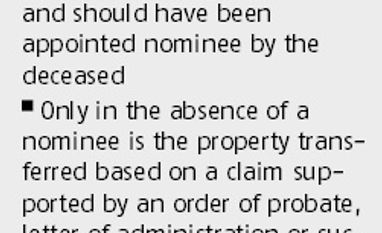The Supreme Court gave a landmark judgement on nomination on March 10, 2016. In the case of Indrani Wahi versus Registrar of Cooperative Societies and Others, it held that the nominee of a deceased member is entitled to ownership by transfer, if she is a relative of the deceased person, who made the nomination in her name, according to the record of the cooperative society. And the co-operative society cannot challenge the right of nominee. And for this, no legal heirship, court order or succession certificate or letter of administration is required. This judgement pertains to West Bengal and Section 79 of the West Bengal Cooperative societies Act 1983 and Rule 127 of the West Bengal Cooperative Society Rules 1987.
Gist of the case
The case pertains to West Bengal and the applicable Act is the West Bengal CoOperative Societies Act, 1983. Indrani Wahi, daughter of Biswa Ranjan Sengupta, had valid nomination in her name for the flat belonging to her father, Biswa Sengupta, according to the record of the society at Kolkata. The dispute arose between Indrani Wahi and her mother about the transfer of the flat, with her mother claiming that she is the rightful owner after her husband’s death, even though her daughter Indrani Wahi had a valid nomination made by her father in her name, according to the record of the co operative society. The litigation went up to the Supreme Court, which decided the dispute in favour of Indrani Wahi.
Section 79 of the West Bengal Co-operative Societies Act 1983 and Rule 127 of the Rules 1987 provide that if a nomination has been made by a member under Section 79, the share or interest or the value of such shares or interest standing in the name of the deceased member would be transferred to the nominee.
Rule 127 postulates nomination in favour of a person “belonging to his family”. Indrani Wahi, being a married daughter of the original member, Biswa Ranjan Sengupta, could be treated as a member of the family of the deceased. The single judge and also the division bench of the High Court concluded that the appellant, Indrani Wahi, is a member of the family of Biswa Ranjan Sengupta, the original member. The respondents, before this court, have not assailed this conclusion.
Rule 128 of the 1987 Rules also leads to the same inference. Rule 128 provides that only in the absence of a nominee would the transfer of the share or interest of the erstwhile member be made based on a claim supported by an order of probate, a letter of administration or a succession certificate (issued by a court of competent jurisdiction).
More From This Section
There is no doubt in our mind that even Rules 127 and 128 of the 1987 Rules lead to the inference that in the case of valid nomination, under Section 79 of the 1983 Act, the co-operative society is liable to transfer the share or interest of a member in the name of the nominee. The Cooperative Society has no option whatsoever, except to transfer the membership in the name of the nominee, in consonance with Section 79 and 80 of the 1983 Act (read with Rules 127 and 128 of the 1987 Rules). It shall, however, be open to other members of the family to pursue their case of succession or inheritance, if so advised, in consonance with the law.
Section 30 of the Maharashtra Cooperative Society Act 1960, Act provides: “On the death of a member of a society, the society shall transfer the share or interest of the deceased member to a person or persons nominated-in-interest in accordance with the rules or, if no person has been nominated, to such person as may appear to the committee to be the heir or legal representative of the deceased member.”
Also, Rule 25 of the Maharashtra Cooperative Societies Rules, 1961, provides: “For the purpose of transfer of his share or interest under Section 30, a member of society may, by document signed by him or by making a statement in the book for the purpose by the society, nominate any person or persons.”
State laws different
When we go through the Section 30 of the Maharashtra Cooperative Society Act, 1960, and Rule 25 of the Maharashtra Cooperative Society Rules, 1960, it is evident that the Supreme Court judgment is also applicable in the case of societies registered under the Maharashtra Cooperative Society Act 1960. In Maharashtra also, it is a must to transfer the flat in the name of nominee and he may or may not be part or full owner of the property. The Society has no right to ask for no objection from the legal heir of the deceased. The only difference between the West Bengal Cooperative Society Rules, 1987, and the Maharashtra Cooperative Society Rules, 1961, is that in the former, the person nominated shall be a family member and in Maharashtra the person nominated need not be a family member of the deceased. In West Bengal, the family member nominated becomes part or full owner of the property after the death of the original owner. However, in Maharashtra, the person nominated becomes only the caretaker and he must transfer the property to the the rightful legal heir of the deceased.
The writer is a Chartered Accountant
)